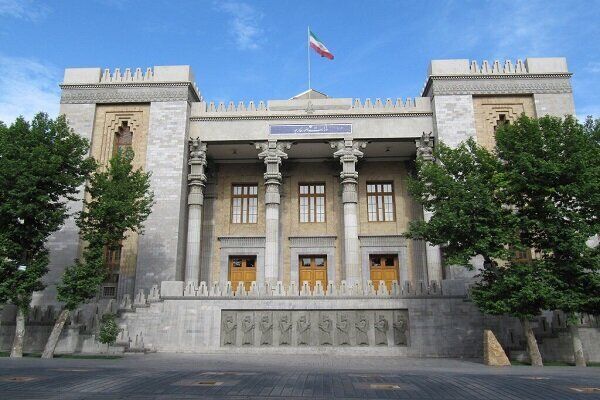ID :
581042
Wed, 11/04/2020 - 22:27
Auther :
Shortlink :
https://oananews.org/index.php//node/581042
The shortlink copeid
Iranian lawyers, Uni profs calls on UN to help free Iranian diplomat detained in Belgium

London, Nov 4, IRNA - A group of university professors, lawyers and jurists have called on the United Nations (UN) to interfere in the process of freedom of an Iranian diplomat arrested in Belgium.
The professors, lawyers and jurists expressed their demand in a statement in support of the third counselor of Iran's Embassy in Austria on Tuesday.
Assadollah Assadi was arrested when crossing border from Belgium into Germany in July, 2018.
The statement stressed that Germany and Belgium have violated his "diplomatic immunity."
A copy of statement has also been published by Lawyers Without Borders website.
The full text of the statement follows:
‘In the Name of Allah’
Statement by a group of university professors, lawyers and jurists in Support of Mr. Assadollah Assadi, Iranian Diplomat Detained in Belgium
On 1 July 2018, Mr. Assadollah Assadi, the third counselor of the Embassy of the Islamic Republic of Iran in Austria, was arrested while crossing the border into Germany. The move was prompted by a European arrest warrant issued by a court in Belgium on trumped-up charges. Following that, his diplomatic immunity was revoked by the Austrian Government and he was extradited to Belgium, and two years later, the case was sent to the court in July 2020.
In diplomatic law, the political staff of embassies shall enjoy immunity. According to Article 29 of the 1961 Vienna Convention on Diplomatic Relations, a diplomatic agent shall enjoy immunity from the criminal jurisdiction of the receiving State. Furthermore, Article 29 refers to inviolable character of the diplomatic agent where it announces that: “the person of a diplomatic agent shall be inviolable. He shall not be liable to any form of arrest or detention. The receiving State shall treat him with due respect and shall take all appropriate steps to prevent any attack on his person, freedom or dignity.”
In case a diplomatic agent violates the national law of the receiving State, he/she shall enjoy inviolability from both legal/criminal jurisdictions of every kind. In worst case scenario, the receiving State can declare him/her persona non grata which could subsequently result in termination of his/her function with the mission.
In other words, declaring ‘persona non grata’ is the severest diplomatic action the receiving State can impose against the diplomatic agent.
Also, under Article 40 of the Convention, “if a diplomatic agent passes through or is in the territory of a third State, which has granted him a passport visa if such visa was necessary, while proceeding to take up or to return to his post, or when returning to his own country, the third State shall accord him inviolability and such other immunities as may be required to ensure his transit or return.
The same shall apply in the case of any members of his family enjoying privileges or immunities who are accompanying the diplomatic agent, or traveling separately to join him or to return to their country.” Accordingly, a diplomat who is returning to his or her place of mission (while being on leave or from the sending State) shall enjoy diplomatic immunity.
Mr. Assadollah Assadi, due to the official visit of the President of Iran to Vienna and the need to attend the welcoming ceremony, started to move towards Vienna but in his way back to the Embassy of Iran in Vienna, was arrested unlawfully by the German police.
We, the undersigned, a group of university professors, lawyers and jurists, while declaring the actions of the German and Belgian governments as a serious violation of the 1961 Vienna Convention as well as diplomatic practice, do believe that the detention of Mr. Assadollah Assadi in Europe is internationally unlawful, and while expressing our strongest objection to the above mentioned actions, we respectfully request the United Nations to hold the Belgian and German States accountable for their actions, with the purpose of safeguarding the fundamentals of diplomatic relations, and the need for respecting the provisions of the Convention.
We demand the Ministry of Foreign Affairs to seriously pursue the issue of bringing a claim against these two States before the International Court of Justice and to inform the public opinion and the legal community of the country about the taken actions.
We declare our preparedness to pursue the case in coordination with the relevant institutions and request the legal community, especially lawyers, to participate in the campaign for Mr. Assadi’s freedom.
A group of university professors, lawyers and jurists.
Iranian Foreign Ministry spokesman Saeed Khatibzadeh, too, has reacted to the unfounded reports of the foreign media concerning the Iranian diplomat in Belgium Assadollah Assadi.
In reaction to a Reuters news report on an Iranian diplomat, he noted that the countries involved in the case are accountable for violating the rights of Iran’s diplomat.
Iran regards the detention of Assadollah Assadi as an unlawful act and a violation of international law and the provisions of the 1961 Vienna Convention.
Iran has already formally issued its strong objections to the authorities of the relevant European governments.
Iranian officials have stresed that Tehran reserves the right to respond proportionately to this end.





